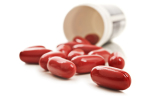|
2001/05/22, 01:15 PM
How good is this supp.? Also what is the name of the supp. that aids in helping to protect the joints?
|
|
|
|
2001/05/23, 01:03 AM
Its a great supp. it protects your body from the catabolic state and also helps in muscle growth.But for better results, you may consider combining it with some creatine.
|
|
2001/05/23, 01:28 AM
Great advice uttiya.
L-Glutamine is best taken in the morning prior to breakfast and right after your workouts.
.o0 Arnold 0o.
|
|
2001/05/23, 11:11 AM
Is this the same as glutamic acid, or a different amino? Did anyone remember that supp. that aids in joint strengthening?
|
|
2001/05/24, 12:17 AM
The amino acid L-Glutamine is the most abundant free-form amino acid found in muscle tissue. Like other amino acids, L-Glutamine plays a vital role in protein metabolism and muscle recovery. L-Glutamine is not only utilized by muscle tissue, but also in large quantities by the immune system and by the digestive system as well. During periods of intense training, levels of this amino acid can decline and our bodies may not be able to make enough of it. This can result in depleted L-Glutamine levels in our muscles and thus cause muscle-tissue breakdown. L-Glutamine is used in an attempt to boost strength levels, enhance gains in muscle size and strength and prevent muscle tissue breakdown that can occur subsequent to strenuous exercise. By supplementing the diet with L-Glutamine, weight training athletes may be able to prevent muscle tissue breakdown and help promote cell volumization. When glutamine is in short supply, muscle tissue becomes the first to sacrifice it. Thus muscle tissue breaks down which leads to "flat" muscles, less strength and a very unfavorable environment for muscle growth. However, when glutamine is in abundant supply, the opposite occurs. High muscular levels of glutamine and other cell volumizes like Taurine, can lead to protein metabolism and cell volumizing. Cell volumizing is a process whereby water molecules are pulled into the muscle cell, helping them look "fuller" or more "pumped" and thereby creating the necessary conditions for muscle growth.
|
|
2001/05/24, 11:35 AM
Nice piece on that. One small question. I take methoxypro and if you look at it's ingredients, it has a ton of amino acids, except L-glutamine. IT does have glutamic acid. Should I get a bottle of L-glutamine caps or would creatine with glutamine be sufficient? Please let me know on this.
|
|
2001/05/26, 04:06 AM
anyone know if i can take glutamine with HMB?
|
|
2001/05/26, 11:39 AM
I always take glutamine seperatly, like Arnold said take about 5-10 grams 15 mins before breakfast.Then, straight after your workout with some protein.
It's like all the amino acids you get in the protein drinks but i still take extra BCAA's! And yes, you can take it with HMB.
|
|
2001/05/26, 08:32 PM
The answer you were looking for is glucosamine and chondroitin for the joints.
Also some literature says that if you take glutamine after workouts then the need for extrat BCAAs at that point is unecessary. Just take your carbs then protein an hour later.
|
|
2001/05/29, 11:47 AM
Thanks skylar, I couldn't think of it. DO you take that supp.? And what does BCAA stand for? You probably think I am a total jackass now. LOL.
|
|
2001/06/02, 08:21 PM
BCAA stands for branched chain amino acids. I take glutamine but not glucosamine as glucosamine made my muscles crampy.
|
|
2001/06/05, 06:14 PM
Could someone please tell me real quick how many milligrams of glutamine does it take to equal 1 gram? Thanks!
|
|
2002/01/05, 01:12 PM
1000 milligrams = 1 gram, according to my conversion program.
|













